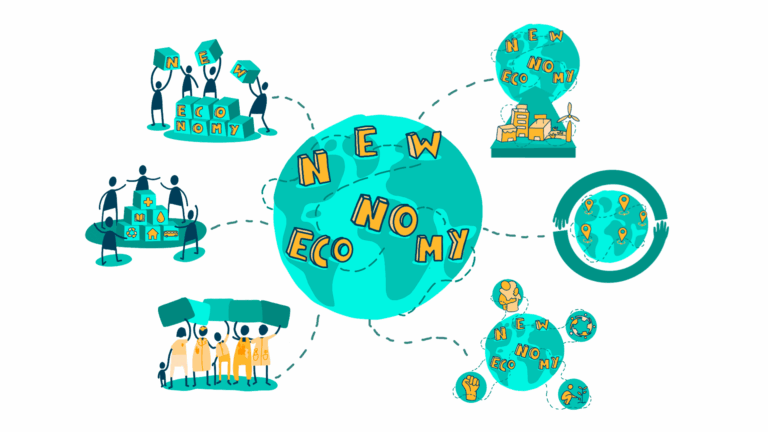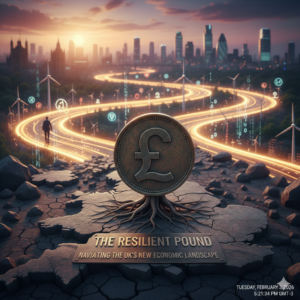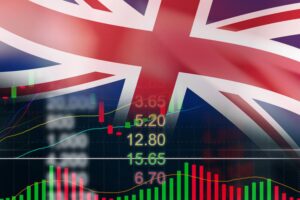
The UK Economy in 2025: Opportunities and Challenges in a Globalised World
The UK in 2025 The UK is one of the richest countries in the world. As one of the world’s major economies, the UK is still a key player in global trade, finance and R&D. But recent years have brought significant challenges — from Brexit and global pandemics to inflation and energy price fluctuations. Amidst this UK consider to negotiate these choppy waters, more so than ever before there is a pressing need to remain informed about the prevailing position and future for the UK economy.

💹A Snapshot of the UK Economy
The UK is a developed country and has the world’s sixth-largest economy by nominal GDP and ninth-largest economy by purchasing power parity. The economy is largely service-based and, in addition to the above services, financial services and other services to business and households constitute the EU’s largest economic sector representing approximately 80% of GDP. London is a world financial centre, and is one of the six largest financial centers in the world; it is home to the Bank of England and some of the world’s largest banks and insurance companies.
The UK economy in 2025 The UK economy is currently catching up from the energy crisis and a peak in energy and inflationary pressure in 2022–2023 before it will find itself growing at a relatively slow (1.2%) pace in 2025. Anemic as it is, this growth represents a return to relative stability, buoyed by consumer spending, a solid labor market and improved exports.
✅Post-Brexit Adjustments
The UK has changed significantly since we officially left the European Union early last year. Gradually, Brexit caused trade disruptions, labor shortages in important industries such as agriculture and health care, and regulatory chaos. But by 2025 many of these problems have been somewhat resolved.
New trade deals with countries like Australia, Japan and the members of the Comprehensive and Progressive Agreement for Trans-Pacific Partnership (CPTPP) have created new markets elsewhere. However, trade with the EU is still an important part of the UK’s economy, and ongoing talks affect tariffs, customs systems and regulatory alignment.
💰 Inflation and Interest Rates
Inflation has been a dominant worry recently with the global supply chain shattering as surging energy prices, and labor markets strained. In 2022, the UK experienced inflation of more than 10%, but the Bank of England took swift action—14 raising interest rates and tightening monetary policy—and brought it down to a more manageable 3.5% by mid-2025.
Nevertheless, high interest rates have taken a toll in other areas, mainly in housing. Mortgage rates have increased, cooling house price growth and weighing on consumer confidence. Nevertheless, the check on inflation has been the basis for longer run stability.
⚙️Chapter 6 The Labour Market: Adaptable in the Face of Change
One of the areas of strength in the U.K. economy is its labor market. Unemployment is still low, near 4 percent and near where it was before the pandemic. COVID-19 has accelerated the adoption of remote work as a permanent fixture for many industries, providing greater flexibility and potential productivity benefits.
Still, there are workforce troubles. Sectors including health and social care, hospitality, and logistics face skills gaps because of the fall in EU migration. The UK government has responded with changes to visa systems to entice foreign talent and investment to further skill domestic workers.
📉 Key Sectors Driving Growth
Technology and Innovation
The UK is leading the world in tech innovation. London, Manchester and Edinburgh are all hubs for fintech, artificial intelligence and green tech start-ups. Government subsidies, university collaborations and venture capital are driving this digital overhaul.
Green Economy
The UK has committed to being, all things being well, net-zero by 2050 and is pouring investment into renewables, electric vehicles, and carbon capture. Wind power in particular is a success story — offshore wind farms now provide more than 30 per cent of the UK’s electricity.
Financial Services
The City of London is still a player in global finance, despite Brexit. Investment is still being drawn to the area in light of regulatory reforms and a sound legal system. The UK is also striving to establish itself as a center for sustainable finance and digital assets.
Tourism and Culture
Tourism is bouncing back as travel bans lift. Millions of people still visit the UK each year and benefit from some fantastic culture, heritage and landmarks and experiences like the Edinburgh Festival and Wimbledon. This industry makes an important contribution to local economies and employment.
🧠 Challenges on the Horizon
Although there are some good reasons to be cheerful in the news, the UK economy still has some obstacles to overcome:
Slowdown in Productivity: We have seen alarmingly weak performance of productivity; it has impacted competitiveness and wages.
Unequal England: London and the South East remain economically divided from the rest of England. Efforts such as the “Levelling Up” agenda are designed to tackle this, but struggle with implementation challenges.
Ageung Population: As the population ages the demand for public services and pensions increases.
Public debt: Excessive government borrowing during the pandemic continues to weigh on the fiscal budget. The challenge is to finance debt while investing in infrastructure and public services.
📲Future Outlook
Looking further afield, the UK economy will remain moderate based on innovation, increasing trade diversity and sustainability. For long-run prosperity, digitally transformed and green investments will be critical.
Nonetheless, policy makers will need to stay alert. Reactions to global shifts – for instance AI integration, geopolitical turbulence and climate change – will need to be nimble and far-sighted.
The focus will need to be on regional development, on improving educational achievement and on infrastructure investment if productivity is to be increased and inequality reduced. Trade policy will also be pivotal — balancing autonomy with coöperation with the EU and global partners.
🎯Conclusion
The UK economy of 2025 – resilient yet reinvented. The country is not without its challenges, but sales of technology and writing in the sustainability sphere, as well as its profitability and its position as a major financial and cultural hub has made it easier for it to adjust to its new role on the world stage without the EU in support.
There are still opportunities for investors, businesses and people in the UK – as long as they’re adaptable and focussing on the future. As the world changes, so does the UK economy—the result of past legacies, a force for new ideas and a champion of change.
Our Post


The Resilient Pound: Navigating the UK’s New Economic Landscape


